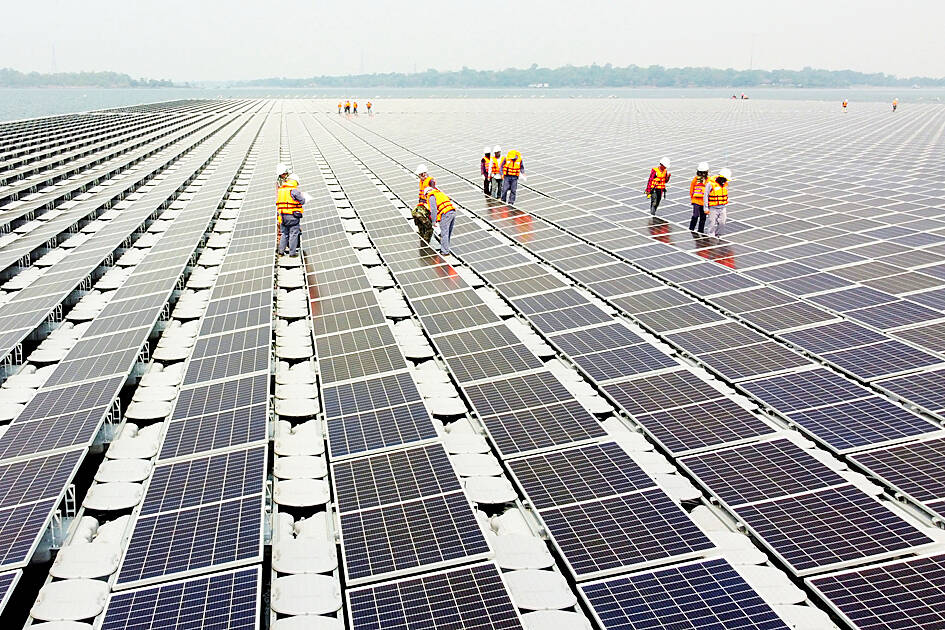The US Department of Commerce set preliminary duties on solar imports from Southeast Asia, after an initial finding that the equipment is benefiting from illegal government aid.
The determination marks an early victory for domestic panel makers who say cheap imports are harming their operations and threatening investments meant to cultivate a US solar supply chain. They asked the government to impose the duties, arguing the equipment benefits from unfair foreign subsidies and is being sold at prices below the cost of production.
The targeted nations provide the bulk of US solar cell and module imports, and the swift imposition of countervailing duties means renewable developers would face higher prices for that equipment right away. For many imports from Thailand and Vietnam, rates would apply retroactively, going back 90 days to early July.

Photo: Reuters
The case marks only the latest bid by US manufacturers to confront overseas rivals, beginning with similar duties on solar imports from China about 12 years ago. Chinese manufacturers responded by setting up operations in other Asian nations that were not affected by the tariffs.
Chinese officials have said new tariffs threaten to slow the speed of the US energy transition and its fight against climate change. The case has drawn opposition from some foreign manufacturers and domestic renewable power developers who argue tariffs could give an unfair advantage to larger incumbent US manufacturers while raising the cost of solar power projects.
“We need effective solutions that support US solar manufacturers and, at the same time, help us deploy clean energy at the scale and the speed we need to tackle climate change and serve growing electricity demand here in the US,” Solar Energy Industries Association president Abigail Ross Hopper said.
“While we recognize the challenging market landscape for domestic manufacturers in the short term, these cases alone will not solve our macro challenges,” Hopper said.
The investigation is set to reach into spring next year — and final rates could be raised, lowered or jettisoned altogether based on the results of the probe.
Under Tuesday’s action, preliminary general rates for companies not specified by the commerce department are 8.25 percent for Cambodia, 9.13 percent for Malaysia, 23.06 percent for Thailand, and 2.85 percent for Vietnam.
Company-specific rates include 14.72 percent for imports from Hanwha Q Cells Malaysia Sdn Bhd; 3.47 percent for imports from certain JinkoSolar Holding Co Ltd (晶科) entities in Malaysia, 0.14 percent for Trina Solar Science & Technology (Thailand) Ltd, and 2.85 percent for certain JA Solar Technology Co (晶澳) entities in Vietnam.
The department is still conducting its initial investigation into claims that solar imports from the targeted countries are being dumped in the US and sold below the cost of production. It is expected to reveal a preliminary finding in that case next month.

When an apartment comes up for rent in Germany’s big cities, hundreds of prospective tenants often queue down the street to view it, but the acute shortage of affordable housing is getting scant attention ahead of today’s snap general election. “Housing is one of the main problems for people, but nobody talks about it, nobody takes it seriously,” said Andreas Ibel, president of Build Europe, an association representing housing developers. Migration and the sluggish economy top the list of voters’ concerns, but analysts say housing policy fails to break through as returns on investment take time to register, making the

‘SILVER LINING’: Although the news caused TSMC to fall on the local market, an analyst said that as tariffs are not set to go into effect until April, there is still time for negotiations US President Donald Trump on Tuesday said that he would likely impose tariffs on semiconductor, automobile and pharmaceutical imports of about 25 percent, with an announcement coming as soon as April 2 in a move that would represent a dramatic widening of the US leader’s trade war. “I probably will tell you that on April 2, but it’ll be in the neighborhood of 25 percent,” Trump told reporters at his Mar-a-Lago club when asked about his plan for auto tariffs. Asked about similar levies on pharmaceutical drugs and semiconductors, the president said that “it’ll be 25 percent and higher, and it’ll

NOT TO WORRY: Some people are concerned funds might continue moving out of the country, but the central bank said financial account outflows are not unusual in Taiwan Taiwan’s outbound investments hit a new high last year due to investments made by contract chipmaker Taiwan Semiconductor Manufacturing Co (TSMC, 台積電) and other major manufacturers to boost global expansion, the central bank said on Thursday. The net increase in outbound investments last year reached a record US$21.05 billion, while the net increase in outbound investments by Taiwanese residents reached a record US$31.98 billion, central bank data showed. Chen Fei-wen (陳斐紋), deputy director of the central bank’s Department of Economic Research, said the increase was largely due to TSMC’s efforts to expand production in the US and Japan. Investments by Vanguard International

WARNING SHOT: The US president has threatened to impose 25 percent tariffs on all imported vehicles, and similar or higher duties on pharmaceuticals and semiconductors US President Donald Trump on Wednesday suggested that a trade deal with China was “possible” — a key target in the US leader’s tariffs policy. The US in 2020 had already agreed to “a great trade deal with China” and a new deal was “possible,” Trump said. Trump said he expected Chinese President Xi Jinping (習近平) to visit the US, without giving a timeline for his trip. Trump also said that he was talking to China about TikTok, as the US seeks to broker a sale of the popular app owned by Chinese firm ByteDance Ltd (字節跳動). Trump last week said that he had